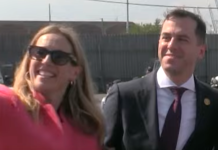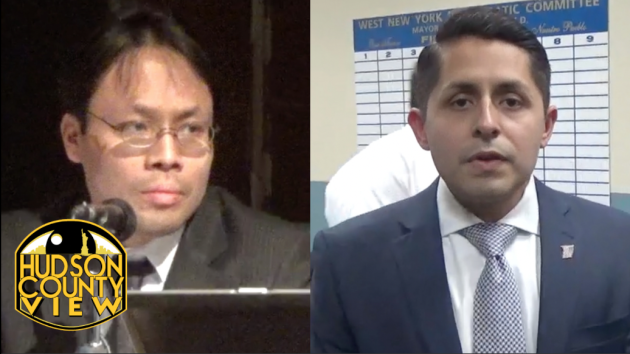Seven of the eight Jersey City Board of Education candidates in the non-partisan November 8th election participated in Hudson Media Group’s debate on Thursday evening to discuss topics including fiscal responsibility, teacher shortages, test scores, and much more.
By Emma Hot/Hudson County View
The“Education Matters” team, consisting of Afaf Muhammad, Christopher Tisdale, an educator, and Trustee Noemi Velasquez each participated, as did the “Change for Children” slate of Trustee Alexander Hamilton, Kenny Reyes, and Doris Toni Ervin.
One of two independents in the race Isnel Sanon, who runs a tax service firm, also fielded questions from HCV’s John Heinis. The other independent, Ashan Nawaz, did not attend.
All candidates seemed to be in agreement that that there has been some version of wasteful spending at the district, in light of a nearly $974 million budget with a roughly $1,608 tax increase this year, but the candidates differed in how they would fix that.
Reyes mentioned, “Anything relating to teachers when it comes to cuts is off the table,” while his running mate Hamilton suggested that the need for a budget officer is essential and he would support bringing this position into the district at a six-figure salary.
“If that means paying somebody $150,000, $175,000 a year to be qualified for the position, that’s fine if they find $20-30-40 million in waste. That’s what we need to do first, clean up our house.”
On the other hand, Tisdale does not think hiring a budget officer is necessary since those duties should already be performed by the business administrator.
Meanwhile, Sanon suggested solutions that prove helpful in the business world, such as having monthly meetings in which the BOE reviews what has taken place the past month and identifies what is working and what is not to reduce wasteful spending.
“If elected, one of the things I want to do, I want to spend my time working with the superintendent’s office, reviewing the policy that we have in place currently. Working with the purchasing department and making sure whatever budget agreed on, the money is spent exactly as it should.”
He also vowed that he would work with all nine trustees if elected “to negotiate fairly for the Jersey City residents, as well as our students.”
Heinis next brought up the nationwide teacher shortage and how, if elected, the trustees would attract more teachers to the district.
Sanon very passionately supported the creation of a “warm and welcoming environment,” for all staff in the Jersey City school district. He believes that letting the teachers know that the administration will be there for them in a time of need is crucial in keeping the talent they already have and hopefully drawing in new talent.
According to Sanon, a line of open dialogue and communication will bring new teachers.
Muhammad wants to look inside at the staff Jersey City already has. These are substitute teachers and teacher-aids. Putting them into their own classrooms adds a level of familiarity and loyalty to the district that hiring new teachers does not bring.
“Definitely reaching in now to the teachers that we have and placing them into their own classrooms and giving them responsibility for their own selves and with the children, I think they have a lot of experience being a substitute for many years with a master’s degree in teaching.
An idea was introduced by Velazquez in which she wants to try and hold teachers down to their jobs due to the amount of time and money put in to train the new teachers.
Hamilton advocated for evening out the pay scale for the teachers in Jersey City. He mentions how teachers are, “using Jersey City as a minor league system. They stay for three, four years and then leave.”
He blames that on the teacher’s salaries. They are being outbid by other districts and based on their budget, the Jersey City school district simply cannot compete.
On the opposing side, Tisdale claims that 70% of the budget is already allocated to teacher salaries and brings the question, “If you increase their salaries, what is that going to do to the Jersey City resident taxes?”
Tightening up the budget was a reoccurring theme, especially due to a roughly $1,162 tax increase from the city’s $724.8 million budget that was approved earlier this month. Whether or not City Hall needs to do better was disputed among candidates.
Velasquez suggests using the extra funds to train the teachers and bring in state-of-the-art equipment.
On the other hand, Muhammad would like to see the budget put on hold so the BOE as a whole can step back and reevaluate.
Hamilton wants the BOE to, “make sure the tax shell game stops between the state, the county, the city, and the school board district.”
As for Tisdale, he pointed out that at the moment, only 25 percent of the property taxes go to supporting the schools in Jersey city, whereas in most municipalities it’s up to 50 percent.
He also said that tax increases and hires at City Hall don’t get the same level of scrutiny as they do at the school board.
“If the district had strict policies in place, and the board members actually know what policies are in place … they can read resolutions a little more clearly and with accuracy to understand that whatever it is they’re voting on, does not match the policy they have written. I can guarantee you that that has not been happening.”
Another topic of discussion involved the funding of community schools in Jersey City which all candidates also supported. They agree that there should be funds allocated to community schools because it gives parents more options on where to send their children.
Ervin suggests using the funds for community schools to try and get back proficiency levels because of the learning loss that has been apparent throughout the past couple of years during the COVID-19 pandemic – which no one disagreed with.
However, Tisdale, an educator in Bergen County, said that he didn’t agree with standardized test scores being the end all be all.
While their was occasional sparring over what Change for Children stood for, with Tisdale indicating that the LeFrak Organization – who has supported them via a super PAC – would seek to hinder school funding, Hamilton said this was a misnomer.
“There’s a lot of mudslinging going around about developers and their role in school board elections: first of all, no one here is beholden to them, I want to be very clear about that. I’ve never voted that way and I’ve always spoken my mind,” Hamilton said.
“The one thing I do want to say is we do need to look for developers to be partners with us. Last time I checked, the city didn’t build a new school, it was the developers who built the annex at P.S. 16.”
Velazquez also took aim at Ervin and Reyes for noting that had never participated in the district’s budget meetings as they spoke about responsible budgeting, but Reyes replied that the meetings stream Live on Facebook and therefore don’t require in-person attendance.
“I don’t believe that we actually increased taxes, we increase a budget to increase instruction,” Velazquez said during her closing statement.
With that in mind, the candidates did agree on some topics.
For example, they all felt that an appointed board was a bad idea (Tisdale said it would just be people who would do the mayor’s bidding) and that teachers and school staff deserve the full support of the district throughout the year.








